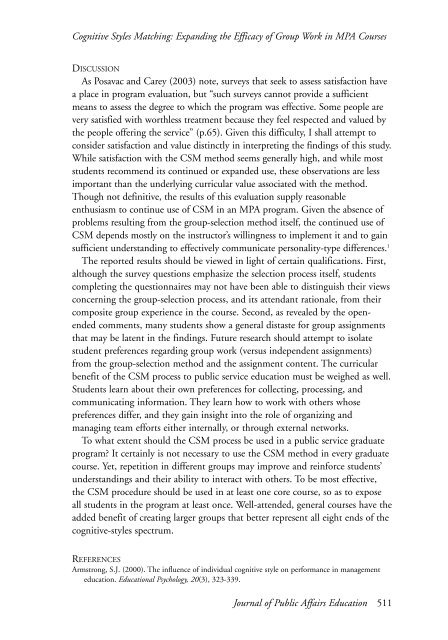JOURNAL OF PUBLIC AFFAIRS EDUCATION - National ...
JOURNAL OF PUBLIC AFFAIRS EDUCATION - National ...
JOURNAL OF PUBLIC AFFAIRS EDUCATION - National ...
You also want an ePaper? Increase the reach of your titles
YUMPU automatically turns print PDFs into web optimized ePapers that Google loves.
Cognitive Styles Matching: Expanding the Efficacy of Group Work in MPA Courses<br />
DISCUSSION<br />
As Posavac and Carey (2003) note, surveys that seek to assess satisfaction have<br />
a place in program evaluation, but “such surveys cannot provide a sufficient<br />
means to assess the degree to which the program was effective. Some people are<br />
very satisfied with worthless treatment because they feel respected and valued by<br />
the people offering the service” (p.65). Given this difficulty, I shall attempt to<br />
consider satisfaction and value distinctly in interpreting the findings of this study.<br />
While satisfaction with the CSM method seems generally high, and while most<br />
students recommend its continued or expanded use, these observations are less<br />
important than the underlying curricular value associated with the method.<br />
Though not definitive, the results of this evaluation supply reasonable<br />
enthusiasm to continue use of CSM in an MPA program. Given the absence of<br />
problems resulting from the group-selection method itself, the continued use of<br />
CSM depends mostly on the instructor’s willingness to implement it and to gain<br />
sufficient understanding to effectively communicate personality-type differences. 1<br />
The reported results should be viewed in light of certain qualifications. First,<br />
although the survey questions emphasize the selection process itself, students<br />
completing the questionnaires may not have been able to distinguish their views<br />
concerning the group-selection process, and its attendant rationale, from their<br />
composite group experience in the course. Second, as revealed by the openended<br />
comments, many students show a general distaste for group assignments<br />
that may be latent in the findings. Future research should attempt to isolate<br />
student preferences regarding group work (versus independent assignments)<br />
from the group-selection method and the assignment content. The curricular<br />
benefit of the CSM process to public service education must be weighed as well.<br />
Students learn about their own preferences for collecting, processing, and<br />
communicating information. They learn how to work with others whose<br />
preferences differ, and they gain insight into the role of organizing and<br />
managing team efforts either internally, or through external networks.<br />
To what extent should the CSM process be used in a public service graduate<br />
program? It certainly is not necessary to use the CSM method in every graduate<br />
course. Yet, repetition in different groups may improve and reinforce students’<br />
understandings and their ability to interact with others. To be most effective,<br />
the CSM procedure should be used in at least one core course, so as to expose<br />
all students in the program at least once. Well-attended, general courses have the<br />
added benefit of creating larger groups that better represent all eight ends of the<br />
cognitive-styles spectrum.<br />
REFERENCES<br />
Armstrong, S.J. (2000). The influence of individual cognitive style on performance in management<br />
education. Educational Psychology, 20(3), 323-339.<br />
Journal of Public Affairs Education 511

















